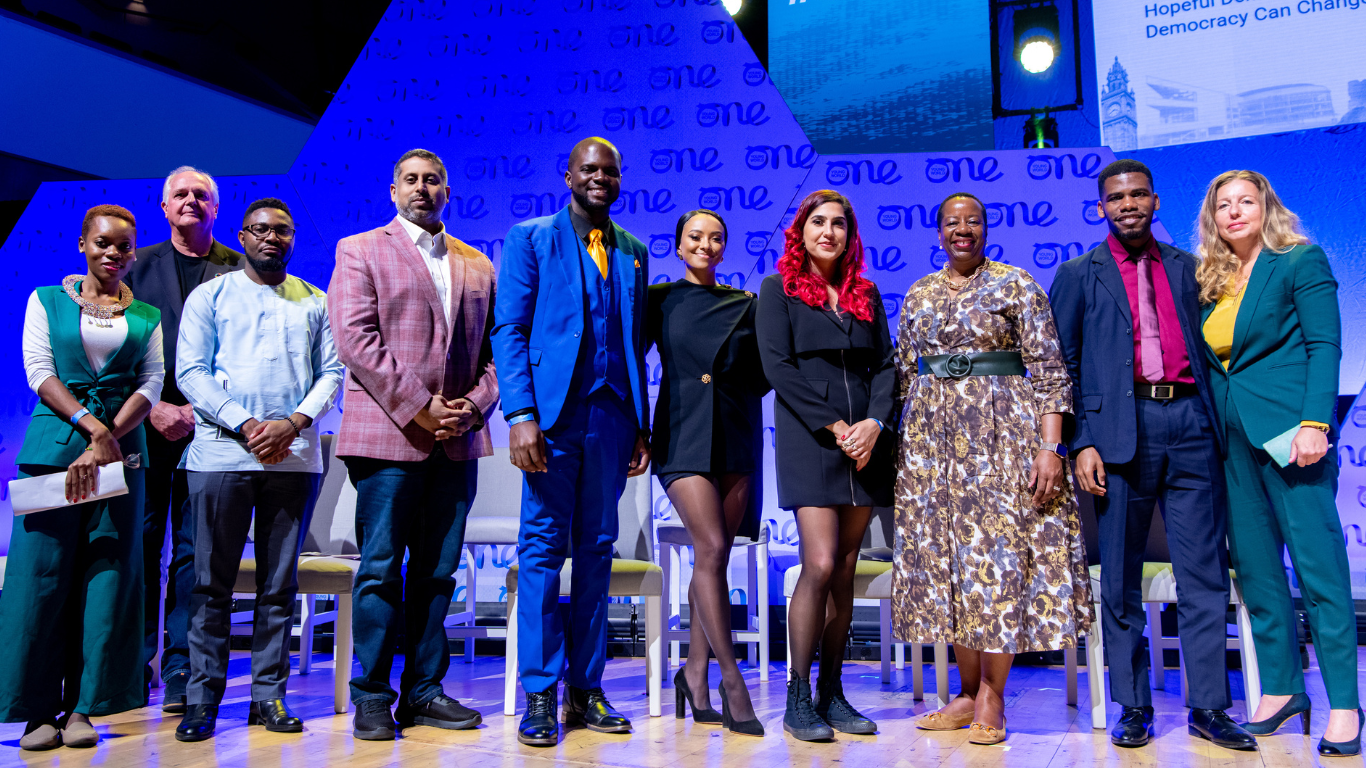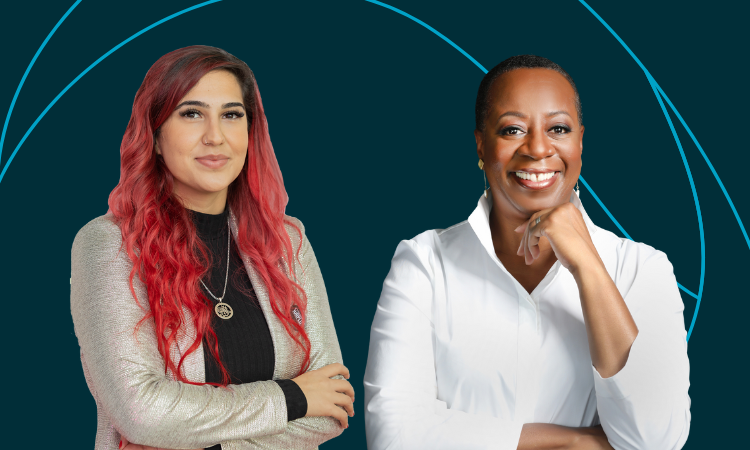Almost a year after they met at the One Young World Summit Belfast, Angela F Williams, President and CEO of United Way Worldwide, discusses learnings from the Summit, climate anxiety, and being a female entrepreneur with Rana Hajirasouli, Founder and CEO of The Surpluss.
Forward by Angela F Williams
The first time I met Rana Hajirasouli she told me, “Growing up in the desert, nothing is waste. You make do with using whatever you have available to you. So, what one person may consider waste, another person may be able to use. Thus, The Surpluss.”
This was during the One Young World Summit Belfast in 2023, where I had the privilege of introducing her as a speaker on the global food crisis. During her presentation, I was blown away by her work in the climate-tech space, which spans 13 years of leadership.

Her organisation, The Surpluss, is a groundbreaking platform that eliminates waste through business-to-business resource exchange. In just one year, businesses using the platform diverted one million kilos of waste from landfills, meeting the Sustainable Development Goals (SDGs) more than 1,500 times.
After our initial meeting in Belfast, I was fortunate enough to reconnect with Rana again in Dubai at COP28, where The Surpluss showcased its unique climate-tech solution, highlighting the future of sustainable business practices. Rana is an innovator and an inspiration, whose work is helping pave the way toward achieving all 17 SDGs.
Although technology recently thwarted our attempt to catch up on a One Young World Instagram Live, I am thrilled that she has agreed to answer my questions in this blog.
Angela: While we were in Belfast, The Surpluss hit a major milestone, onboarding 20,000 companies to your tech platform through a government contract. Nearly one year later, what’s been one of your most impactful achievements?
Rana: Over the last year we have experienced multiple achievements. We have improved our product, expanded our reach and are projecting to sign up 50,000 members using our digital platform by the end of the first quarter of 2025.
We are now an accredited B Corp-certified company, the first climate-tech company in the GCC region to gain this prestigious certification. This opened up more doors for us to make an impact by gaining access to new customers, partners, and jurisdictions which align with B Corp standards.
We have also taken The Surpluss international, launching an SME cluster with passionate partners in Italy, and very soon in Denmark.
Angela: Reflecting on your experience at the One Young World Summit Belfast, what is one key lesson you learned that you’ve been able to apply to your work with The Surpluss?
Rana: The key takeaway I learnt from the Belfast summit was the importance of broad, cross-sector collaboration to instigate real systems change.
What I saw in Belfast was young leaders from different walks of life and backgrounds, coming together with a shared purpose and common values.
The most valuable thing I learned was that real progress only happens when we have diversity, and when people from different sectors roll up their sleeves and work together. This helped strengthen my work at The Surpluss by translating this to enhance our technology stack to connect different players – businesses, social enterprises, governments communities, to find smarter ways to collaborate that will have higher rates of success. This helped ultimately shape my understanding of how to more efficiently locate those that have excess and match them with those that need it, as oftentimes, it is an issue of visibility, which, if executed properly, could have an enormous impact.
It is worth saying that One Young World is no ordinary summit – you cannot find the same sense of shared value and hunger to make a change anywhere else.
Angela: What’s next for the Surpluss?
Rana: On the technical front, we are planning a secondary product extension to our current platform to help our commercialisation. We are working quite hard on coming up with an innovative patent that will help standardise industrial symbiosis and circular economy applications, with a systemic impact.
We are prioritising growth in emerging countries with economic opportunity in mind, which can help large companies engage with their smaller suppliers better, and include the informal market for greater visibility for circular economy adoption. This supports our commercial plans of partnering with large multinationals as well as forward-thinking governments, accelerating action plans and identifying potential challenges and opportunities that align with diversifying economies, attracting FDI from the right industries to create more jobs and contribute to localisation efforts.
Whilst it is early to be talking about policy influence, we do think collaboration with governments will help us better understand the requirements for key manufacturing hubs in industrial parks, economic zones and free zones as this opens up opportunities for aligning institutional interests with profit in mind. This includes Net Zero commitments or Nationally Determined Contributions (NDCs) in line with the Paris Agreement, which is hard to plan for without private sector participation. More specifically, in collaborating, we can provide a potential pathway to build stronger relationships between the public and private sectors to do more with less, catalysing industrial climate action through cross-sectoral applications, bringing industries that would have otherwise not worked together, closer.
Angela: As the founder of a young female-majority startup in the UAE, what’s your advice for other female entrepreneurs?
Rana: My advice for any entrepreneur regardless of gender is to embrace your unique perspectives, fall in love with the problem rather than the solution and sharpen your toolbox to execute potential solutions.
Oftentimes, women entrepreneurs are plagued with imposter syndrome, and I’m hearing this more and more. For those of us who live in non-Western contexts, there are unique sets of challenges to navigate. Build a strong support system, whether that is locating a mentor, joining a female-focused accelerator, friends, or family. But it is equally important to gain diverse but brutally honest perspectives – you can find people who cheer you on, but consistently honest feedback can have an enormous impact on growing and remaining stagnant.
For those more introverted, take the leap of faith and reach out to people you admire. I’ve reached out to hundreds of professionals I thought would be amazing mentors, and only a few responded or agreed. Speaking with others who see the problem is one of the most helpful North Stars to have.
Move past failure, acknowledge it as a learning curve and try to maintain as pragmatic as possible – even if your product/service looks different to what you imagined, being agile and pivoting is key to continuous learning. If you love the problem, the rest will fall into place.
Angela: Given that a CBS News study revealed high levels of anxiety about climate change among young people, what message would you share with those feeling anxious and afraid?
Rana: Many of us feel incredibly anxious about climate change, and your feelings are valid – but they don’t have to hold you back. Action is the antidote to anxiety; take a moment to reflect on some incredible individuals who have transformed their concerns into transformative action with a lasting legacy.
I’d recommend reading about the work of Kenyan Nobel Laureate, Wangari Maathai, who took her anxiety about environmental degradation and deforestation and initiated the famous Green Belt Movement, which not only empowered community autonomy, but also strengthened women’s rights and resulted in more than 51 million trees being planted with a legacy across Africa.
Or, Nemonte Nenquimo, an Ecuadorian leader of the Waorani people in the Amazon Rainforest who led a successful legal battle to protect 500,000 acres of rainforest from oil drilling, inspiring similar movements worldwide and shedding light on powerful Indigenous leadership.
Or, Boyan Slat, the Dutch inventor of the Ocean Clean Up project.
There are many more examples I could share, and you can check the stories of One Young World alumni who have made incredible impacts whether by supporting global movements or leading by example in large companies.
While the scale of the problem can feel overwhelming, all it takes is a few small steps taken by people who care, including you.
Angela: What’s one thing you’re doing as a young leader to prioritise your self-development and growth?
Rana: I think there are two parts to this – the first is continuous learning and reflection. In the incredibly fast-paced world of start-ups and climate tech, it’s easy to get caught up in the day-to-day grind, but I’ve found setting aside time to learn new things and reflect on experiences is crucial.
I’m doing a part-time PhD at Cambridge University, which helps switch my thinking from a fast, commercially focused mindset to a slower, more analytical one that can help me better understand technical nuances around industrial sustainability.
I prioritise up-skilling a few times a year, as does my team, especially when technology is developing so fast. It’s important to keep on top of the latest innovations and trends outside of attending key conferences.
Secondly is personal growth, discipline and maintenance. I book my schedule months in advance, which may seem excessive to some, but as work gets busier, I’ve learned to block out growth in other areas of my life. For example, I carve out a few hours to consistently keep learning Mandarin with an online tutor, keep physically active with boxing, or play piano and drums. This is important for me as a creative outlet, and to help keep me balanced and healthy for the work week, whilst maintaining a productive focus that can help in other aspects of self-development.
My friends and family think I lead quite a robust and quirky lifestyle, but I think it’s important to be healthy and disciplined in your personal life to build resilience and accelerate your growth career-wise.
Angela: How can we support The Surpluss?
Rana: Thank you so much for asking. We are currently looking for partners for expansion in multinational companies and governments, new potential clients, and finding ways to collaborate with social enterprises and registered NGOs to make a positive impact.
Every year, we prioritise a social impact cause and select a partner – last year, it was to tackle food waste and redistribution, this year it is for People of Determination, persons with disabilities, and empowering them in the workplace. Next year, we are scoping ways to collaborate to empower Indigenous communities in a way that maintains their autonomy but also allows them access to provide their services to the international market, if you know of any community-led organisations, please do let us know.
As for passionate young people, we are always looking to hire paid interns, or country ambassadors for those occupied in work, that want to make an impact. Please feel free to follow us on Linkedin, check out our website, or email me personally at [email protected].
